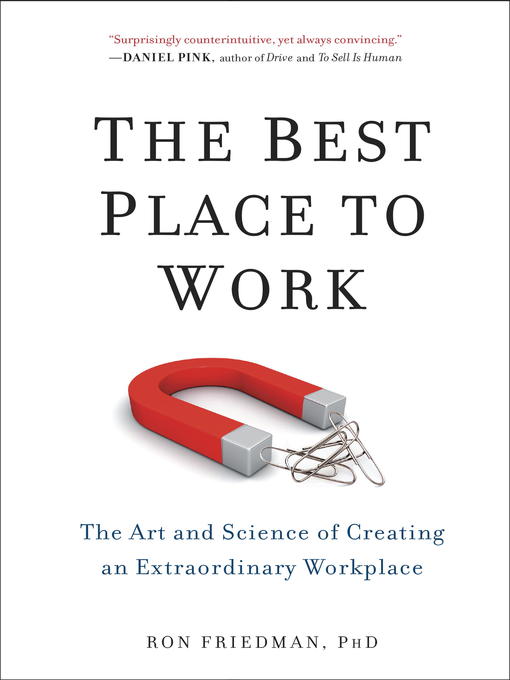The Best Place to Work
The Art and Science of Creating an Extraordinary Workplace
Why do successful companies reward failure?
What can casinos teach us about building a happy workplace?
How do you design an office that enhances both attention to detail and creativity?
In The Best Place to Work, award-winning psychologist Ron Friedman, Ph.D. uses the latest research from the fields of motivation, creativity, behavioral economics, neuroscience, and management to reveal what really makes us successful at work. Combining powerful stories with cutting edge findings, Friedman shows leaders at every level how they can use scientifically-proven techniques to promote smarter thinking, greater innovation, and stronger performance.
Among the many surprising insights, Friedman explains how learning to think like a hostage negotiator can help you diffuse a workplace argument, why placing a fish bowl near your desk can elevate your thinking, and how incorporating strategic distractions into your schedule can help you reach smarter decisions. Along the way, the book introduces the inventor who created the cubicle, the president who brought down the world’s most dangerous criminal, and the teenager who single-handedly transformed professional tennis—vivid stories that offer unexpected revelations on achieving workplace excellence.
Brimming with counterintuitive insights and actionable recommendations, The Best Place to Work offers employees and executives alike game-changing advice for working smarter and turning any organization—regardless of its size, budgets, or ambitions—into an extraordinary workplace.
-
Creators
-
Publisher
-
Release date
December 2, 2014 -
Formats
-
Kindle Book
-
OverDrive Read
- ISBN: 9781101625538
-
EPUB ebook
- ISBN: 9781101625538
- File size: 675 KB
-
-
Languages
- English
-
Reviews
-
Publisher's Weekly
October 27, 2014
World-class cafeterias, on-campus dry-cleaning, and on-site massages—these are some of the ways that companies like Google and Facebook attract and retain employees. But do office perks really make for an improved workplace, and is improving a workplace the best way to create an exceptional company? Psychologist Friedman explores this question in his useful guide. He says he became fascinated with the issue of office culture after leaving academe to work as a pollster in the corporate world. Office design, telecommuting, the importance of exercise, making friends with co-workers, resolving tense moments, and hiring and training the right people are among the range of subjects Friedman examines. His takeaways include “psychological needs are at the heart of employee engagement” and “integrating work and family life improves the quality of both.” Stocked with action items for managers and plenty of case studies, this is an energetic, conversational look at what really makes an office environment tick. As for those on-site massages; it turns out that recognition is the most effective perk of all. Agent: Giles Anderson, Anderson Literary. -
Library Journal
Starred review from November 15, 2014
Citing icons of workplace coolness, innovation, and productivity (e.g., Google, Parnassus Investments, Facebook, and SAS) along with legendary individuals and groups (Babe Ruth, the Beatles, Steve Jobs) to illustrate in practical terms how to harness insights from fields as diverse as psychology, economics, and anthropology, psychologist and management consultant Friedman delivers in spades on his promise of a book worth reading on a business trip. His tips, insights, and spare yet engaging narrative style work brilliantly together to show how a superior workplace can be achieved without the lavish budget for employee perks--free gourmet meals or on-site barbers and dentists--deployed by top-echelon companies. The author's advice about sparking creativity and productivity is convincing, despite it frequently being counterintuitive. (Rewarding "intelligent failure" and mining it for lessons learned is a prime example.) The takeaway is a call to remove the blinders and adopt ideas and techniques pertinent to a world in which "work is infinitely more complex" than before and "productivity hinges on an employee's thinking." VERDICT A must-read for managers, decision makers, and emerging leaders.--Elizabeth Wood, Bowling Green State Univ. Libs., OH
Copyright 2014 Library Journal, LLC Used with permission.
-
Booklist
December 1, 2014
Friedman, consultant on human motivation, reports that the more invested people are in their work, the more successful their organization is on a variety of metrics. He indicates, The stocks of companies on the Best Companies to Work For list outperform the market as a whole by a stunning factor of 2 to 1. In this era when productivity hinges on the quality of an employee's thinking, psychological factors are the very core of what determines success. Technology companies understand this. The author presents revolutionary findings in psychology, neuroscience, behavioral economics, sociology, and anthropology for managers, owners, and CEOs, and he offers uses for creating a better workplace. Friedman presents many valuable ideas and lessons, including those arising from a hostage negotiation and how to motivate top performance. He references Edgar Schein (MIT) in noting the influence of leaders' actions on workplace culture, for example, leaders' priorities versus what they ignore, how they handle negative information and their emotions, and how they distribute rewards and status. An excellent book.(Reprinted with permission of Booklist, copyright 2014, American Library Association.)
-
Formats
- Kindle Book
- OverDrive Read
- EPUB ebook
subjects
Languages
- English
Loading
Why is availability limited?
×Availability can change throughout the month based on the library's budget. You can still place a hold on the title, and your hold will be automatically filled as soon as the title is available again.
The Kindle Book format for this title is not supported on:
×Read-along ebook
×The OverDrive Read format of this ebook has professional narration that plays while you read in your browser. Learn more here.



